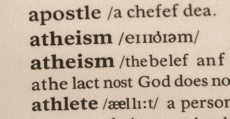In the name of Allāh, ar-Raḥmān (the Most Merciful), ar-Raḥīm (the Bestower of Mercy).
After watching an interview with a Muslim brother from one of the Gulf countries—who had left Islām for atheism, spent many years upon that path, and was later guided back to Islām, alḥamdulillāh – I wrote down some points of reflection in Arabic, intending them for an Arabic-speaking audience.
Several brothers then requested that I share the same points in English, in the hope that Allāh may make them a means of guidance for a Western audience.
I entitled my original points:
عبر وفوائد من رحلة عائد إلى الفطرة بعد تجربة سنين مع الإلحاد
Lessons and contemplations from: ‘The journey of the one who returned from Atheism to the Fitrah.’
The interview was carried out by Shaykh Mutlaq al-Jasir, and the video – in Arabic only – can be viewed below:
The original video is an interview with a man who goes by the name Abu Abdullah. He was raised in a Muslim family in a Muslim country. However, he later renounced Islām and remained upon disbelief for many years – may Allāh protect and preserve us. Eventually, by Allāh’s guidance, he returned to Islām after spending those long years pursuing the “freedom” and “liberalism” he believed he would find in atheism.
His Upbringing and Background
- He is from an Arab Muslim country and grew up in a righteous, cultured, and educated family.
- He is known for his intelligence, broad general knowledge, and photographic memory. From a young age, he loved reading—a passion nurtured by his father, who encouraged him and his siblings to read regularly. However, he would read anything that came his way—both the good and the bad. [1]
- The books he read as a child included A Tale of Two Cities by Charles Dickens, The Merchant of Venice by William Shakespeare, and The Black Tulip by Alexandre Dumas, along with various children’s stories such as the Superman series and similar tales of superheroes. He now believes that such books are not written purely for entertainment, but rather contain subtle yet powerful ideas that influence the minds of young readers.
- He grew up regularly attending the ṣalāh in the masjid and would also participate in some lessons. However, these lessons were mostly limited to general admonitions and heart-softening reminders, focusing on virtuous deeds such as good manners, the merits of ṣalāh, fasting, and charity. There was also a strong emphasis on the virtue of jihād. [2]
- During his youth, he developed a strong sense of Islāmic activism. He would often sing nashīds and was active in student and community work. He served as the president of an Islamic Society (ISOC) at his college or university, the head of the Students’ Union, and the leader of a local Islamic group. [3]
- He had never studied or understood the true essence of ʿibādah. He would pray, but without a deep understanding of why he was praying or the wisdom behind ṣalāh. [4]
- He never studied ʿAqīdah. He explains that he did not truly learn about Allāh – who he is, where he is, his names, attributes, and actions. Likewise, he never acquired knowledge of tawḥīd, nor was he taught about īmān in al-Qadr (divine decree). He also never learned why we were created or what our purpose is on this earth. [5]
- Questions about Islām and belief were not only left unanswered in his family, but were also discouraged. Such questions were often seen as a sign of weak īmān.
How Did He Become An Atheist?
- He went to America on a state-sponsored study program and lived with a very strict Catholic family. At the same time, he began to distance himself from the Muslim community and his Muslim friends who were also in America.
- While there, he constantly felt the need to be accepted in his new environment, and as a result, he did not live according to Islām. His main guiding principle became to gain acceptance from those around him. [6]
- He later realised that his move abroad was not truly for the purpose of studying. Beneath it lay a deeper motive: to escape a Muslim environment that he, at the time, considered “restrictive” and “close-minded,” in favour of one that appeared “free,” “liberal,” and “open-minded.” [7]
- He began to neglect some religious obligations, convincing himself that this integration would somehow be beneficial for da’wah to non-Muslims. [8] The first practice he abandoned was the ṣalāh, while also distancing himself from his Muslim friends and community.
- He was further affected by the harshness of some Muslim friends who boycotted him due to his increasingly un-Islāmic outlook. One close relative who accompanied him in America was particularly strict, which only deepened his sense of isolation.
- He then drifted away from the Sunnah and moved toward Sufism, which led him further from strictly adhering to the Sunnah of the Prophet ﷺ.
- After leaving Islām, he eventually identified as an agnostic – mainly because it was easier on his conscience than outright atheism, and provided a convenient retreat from intellectual challenges and debates. For an agnostic, the answer to any question is simply: “I do not know,” or “I neither affirm nor reject the existence of Allāh; perhaps He exists, and perhaps He does not.”
His Journey Back to Islām
- This turning point began with a personal tragedy: the death of his younger brother. As the older sibling, he was responsible for preparing the funeral. Standing at the graveyard, he wept – not primarily for the loss of his brother, but because he was overwhelmed by the state of his own heart and soul.
- The first person he turned to for guidance was the same relative who had been harsh with him in America. He chose this relative because he saw him as truthful, sincere, and genuinely concerned for his well-being. [9]
- He began returning to Islām gradually; however, this time seeking answers about Islām.
- He joined Dar al-Qur’ān, an institute in his country, where he found two teachers who made time for him, welcomed his questions, and answered them patiently. One teacher guided him through the tafsīr of the 30th Juz’ of the Qur’ān from Tafsīr Ibn Kathīr, chosen because it focuses on īmān, tawḥīd, and events following the Day of Resurrection. The second teacher instructed him in Kitāb at-Tawḥīd by Imām Muḥammad Ibn ‘AbdulWahhāb.
- The two teachers devoted a significant amount of their personal time to him, to the extent that one of them even accompanied him to perform ‘Umrah.
His Advice to Young People Experiencing Doubts About Islām
- Do not suffer in silence, and do not hide any doubts you may have. Do not feel shy about asking questions that trouble you. The real danger lies in keeping a doubt to yourself. Seek guidance from knowledgeable and trustworthy people in your community who can help you understand Islām.
- Failing to make an effort to understand the role of your religion in your life can lead to misguidance.
- Give importance to ṣalāh, as it has a powerful effect in dispelling doubt.
- Maintain good friends and companions who are sincere, genuinely wish you well, and show you compassion and concern.
May Allāh keep us firm upon Islām and protect us from doubts and desires.
May peace and blessings be upon His Prophet and his followers.
Written by Abul Abbaas
Nelson, Lancashire.
6th Jumadi Al-Ula 1440h
Corresponding to 12th January 2019.
Footnotes
[1] There is no doubt that we should encourage our youth to read. However, it is the responsibility of parents or guardians to select books – and especially cartoons or videos – that provide real benefit. Be mindful of the hidden messages some of these materials may carry. Some may contain elements of shirk or kufr, such as stories involving magic. Children should not be left to choose what they watch or read on their own; rather, they should be guided by their parents toward materials that align with Islām and uphold its moral values. I firmly believe that every author, whether of fiction or non-fiction, writes with specific objectives and intentions in mind.
[2] A common doubt among many weak-hearted Muslims is the belief that being a “good person” alone makes one a good Muslim, regardless of ʿAqīdah, ḥijāb, ṣalāh, and other obligations. Some callers who aim to dilute the religion often spread this dangerous misconception. While good manners undoubtedly play an important role in Islām, consider how many people possessed excellent manners yet remained upon a deviated ‘ Aqīdah, and kufr.
Furthermore, the foundation of good manners lies in one’s relationship with Allāh, the strength of a person’s ʿAqīdah, and adherence to the Sharīʿah. Our perspective should never be to value “good manners with people” while neglecting good manners with Allāh.
[3] This is a misconception among many young Muslims, particularly university students, who believe that social or Islamic activism is the primary purpose of Islām. Music, free mixing, and carelessness in worship are often justified in the name of activism. It is important to emphasise that Allāh placed us on this earth to worship Him through Tawhīd and to live our lives within the boundaries of the Sharī‘ah—everything else is secondary to this.
[4] The primary purpose of any act of worship is complete submission to the command of Allāh; any other benefit is secondary.
[5] Unfortunately, some groups downplay the importance of calling to Tawhīd and rectifying people’s ʿAqīdah, even though this was the very purpose for which Allāh sent each of the Prophets. Correct ʿAqīdah forms the foundation of a person’s Islām and helps maintain firmness in the face of doubts. The brother in the interview identifies his lack of study in ʿAqīdah as a key reason for the weakness of his īmān, despite having studied Fadā’il al-A‘māl (The Virtue of Voluntary Actions).
[6] A Muslim only seeks to please Allāh regardless of whether the people around him are accepting or not. The Prophet ﷺ said,
Whoever seeks Allāh’s Pleasure at the expense of men’s displeasure, will win Allāh’s Pleasure and Allāh will cause men to be pleased with him. And whoever seeks to please men at the expense of Allāh’s displeasure, will win the displeasure of Allāh and Allāh will cause men to be displeased with him.
[Narrated by Ibn Hibban in his Saheeh]
True freedom, in this life and, more importantly, in the Hereafter, is found through submission to Allāh. In contrast, a person who is enslaved by their desires or seeks only to please others is destined for misery and unhappiness.
How relevant are the words of the virtuous companion Rab’iyy Ibn ‘Amir to Rustum, the commander of the great Persian Empire, during the Battle of Al-Qādisiyyah in the year 14 AH. When Rustum asked Rab’iyy about his mission, he replied:
Allāh, the Exalted, has sent us to rescue you from worshipping the creation to worshiping the Creator of the creation; and to rescue you from the constriction of this world to the vastness of this world and the Hereafter; and to rescue you from the darkness and oppression of the religions to the justice and light of Islām. Allāh, the Exalted, has sent us to save you from worshipping each other.
[8] Shayṭān misguides people gradually, often beginning with actions that may seem insignificant but can lead to greater sins. For this reason, Muslims should avoid celebrations that are not part of Islām, such as birthdays, anniversaries, New Year’s, Mother’s Day, and similar occasions. Negligence in these matters today can pave the way for many more misguided actions tomorrow—this is precisely Shayṭān’s scheme. Perhaps this is the wisdom behind the Prophet ﷺ warning so strongly against imitating non-Muslims. He said:
Whoever imitates a group of people, will be resurrected along with them.
[Narrated by Ibn’Umar; Collected by Abū Dāwūd]
[9] A person who becomes angry for the sake of Allāh and, at times, applies firmness in correcting a mistake demonstrates genuine care and concern for others. This brother recognised this, which is why the first person he approached was the same relative who had initially been harsh with him. In contrast, mere flattery or belittling of sins is not wisdom; rather, it reflects a lack of courage and weak īmān.
Shaykh ‘Abdul-Aziz Ibn Bāz said:
So your brother is the one who advises you, reminds you, and alerts you. Your brother is not the one who gives you no thought, avoids you, or speaks to you with pretty words that lack real truth and sincerity. Rather, your brother, in reality, is the one who advises you, the one who admonishes you, and reminds you. He calls you to Allaah, keeps explaining to you the path to deliverance clearly until you follow it, and warns you about the path to destruction – he keeps explaining to you how evil its end is until you avoid it.
[Majmu Fatawa Wa Maqalat Mutanawi’ah Vol. 14 P.21]
عبر وفوائد من رحلة عائد إلى الفطرة بعد تجربة سنين مع الإلحاد
الأخ في المقطع السابق قد هداه الله إلى الإسلام بعد أن ارتد لسنوات طويلة – نسأل الله السلامة والعافية لنا ولجميع المسلمين.
نشأة هذا الأخ
– الأخ من دولة مسلمة من أسرة صالحة مثقفة متعلمة.
– كان يحب القراءة وهذا الشوق للقراءة من تربية والده ولكن قراءته منذ صغر غير مميزة فيقرأ الطيب والخبيث.
– كان يحضر الصلاة والحلقات في المسجد ولكن هذه الحلقات عبارة عن مواعظ في فضائل الأعمال كالصلاة والصوم والصدقة والأخلاق وخصوصا فضائل الجهاد إلخ…
– كان لديه ((حركة دعوية)) – حسب مفهومه – أي كان صاحب أناشيد ورئيس ندوة الشباب ورئيس مجلس الطلاب ورئيس الجماعة الإسلامية… إلخ
– لم يتعلم حقيقة العبادة أي كان يصلي ولا يعرف لماذا يصلي فله نقص في المفهوم الصحيح للدين.
– لم يتعلم العقيدة في الدروس والحلقات – أين الله ومن الله وما أسماؤه وصفاته وأفعاله وتوحيده والإيمان بالقدر ولماذا خلقنا… إلخ
– كانت الأسئلة الدينية والعقيدية ممنوعة ويرونها عيبا.
كيف وصل إلى الإلحاد؟
– ذهب إلى أمريكا مبتعثا وسكن مع أسرة كافرة كاثوليكية متعصبة وانعزل عن جماعته الطلاب من بلده
– يريد القبول في هذه البيئة الجديدة فمعياره القبول عند الناس
– ما ذهب إلى أمريكا للدراسة بل هدفه كان الهروب من بلده ومن بيئة مسلمة يراها ضيقة وهو يريد ما يظنه الانفتاح والحرية
– بدأ يتساهل ويتنازل عن أمور دينية ويظن أن هذا التنازل فيه مصلحة دعوية للغير
– أول ما ترك من الأعمال الصلاة والبعد عن زملائه المسلمين
– تأثر بهجران وشدة ردة الفعل من زملائه وخصوصا من أحد أقربائه ومحبيه كان في أمريكا معه وهذا أبعده أكثر فأكثر
– وصل إلى فكرة ((لا أدرية)) بعد الإلحاد الصريح لأن ((لا أدرية)) أيسر على باله وهروبا من نقاشات ولأن (لا أدرية)) لا ينكر الله جحدا بل يقول لا أدري ويمكن هذا ويمكن ذاك…
– قبل ((لا أدرية)) ذهب إلى صوفية فابتعد عن السنة
رجوعه إلى الإسلام
– أول ما بدأ أن يرجع حين مات أخوه الصغير فكان يبكي في الجنازة ولكن ليس البكاء حزنا على فراق أخيه بل بكاء على نفسه وحاله
– أول من ذهب إليه هو نفس القريب الذي اشتد عليه وهجره في أمريكا لأنه ناصحا وصادقا ومحبا له
– بدأ أن يرجع إلى الدين ويبحث عن الأجوبة لما يشكل عليه
– انضم بدار القرآن بكويت وخصص أحد المشايخ درسا خاصا بهذا الأخ ليجيب ما عنده
– بدأ بتفسير جزء عم لأنه ممتلئ بالعقائد وذلك من مختصر تفسير ابن كثير ومعه يدرس كتاب التوحيد للإمام محمد بن عبد الوهاب
– اهتم به الشيخان أحدهما يدرسه التفسير والثاني العقيدة واهتما به شخصيا حتى ذهب أحدهما معه للعمرة
وصيته للشباب
– أن لا يخفي أي سؤال أو شبهة فالخطر في الإخفاء ولكن السؤال لأهل العلم ومن يثق بدينه
– الإهتمام بالصلاة وله أثر نفسي عند الشكوك
– عدم معرفة وظيفة الدين في الحياة سبب لضلال عظيم
– الصحبة الصالحة لإخوة مستقيمين ناصحين محبين لك الخير
كتبه أبو العباس
السادس من جمادي الأولى، ١٤٤٠ هجري



